Cantaloupe is a delicious and nutritious fruit, but is it possible to eat too much? Let’s find out how many calories are in 100 grams of cantaloupe and explore the potential health benefits of this tasty treat.
1 Nutritional Value of 100g Cantaloupe
Nutritional Breakdown of 100g Cantaloupe
According to the United States Department of Agriculture, 100 grams of cantaloupe contains approximately 21 micrograms of vitamin K, 0.734mg of niacin, 2020 micrograms of beta-carotene, 12mg of sodium, 0.21mg of vitamin B6, 9mg of vitamin C, 36.7mg of magnesium, 169 micrograms of potassium, and 34 kcal of energy.
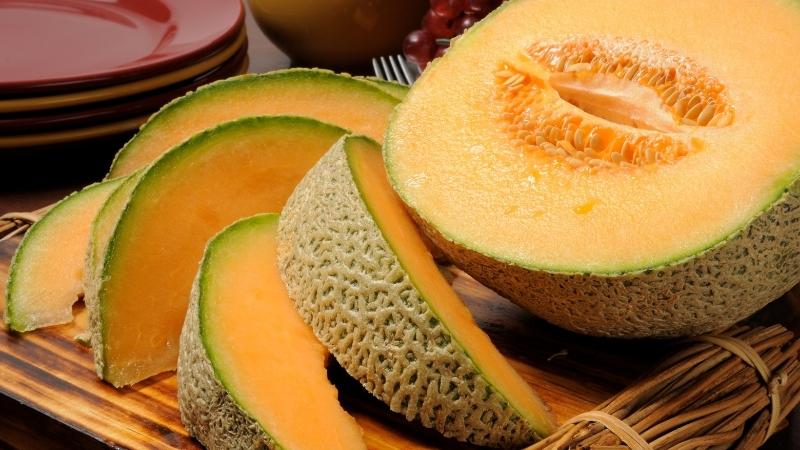 Nutritional Value of 100g Cantaloupe
Nutritional Value of 100g Cantaloupe
Health Benefits of Cantaloupe
- Antioxidant and Anti-Aging Properties for Healthy Skin: According to Thanh Nien newspaper, cantaloupe contains nutrients with antioxidant properties, including Beta-carotene, Vitamin A, Vitamin C, and Cryptoxanthin. These nutrients protect the body’s cells and structures from free radical damage and help prevent aging.
- Heart Health: Cantaloupe is rich in potassium, as well as vitamins C and electrolytes. Consuming cantaloupe can help regulate blood pressure and heart rate, reducing the risk of stroke and coronary artery disease.
- Beneficial for Pregnant Women: Cantaloupe is a good source of vitamin A and Folate, essential nutrients for the development of the fetus and the prevention of anemia.
 Cantaloupe Benefits for Pregnant Women
Cantaloupe Benefits for Pregnant Women
- Eye Health: According to the Linus Pauling Institute at Oregon State University (USA), cantaloupe contains high levels of Lutein and Zeaxanthin Carotenoids, which are essential for maintaining healthy vision.
- Digestive Health and Hydration: Cantaloupe is recommended for those experiencing constipation due to its high water and electrolyte content, which helps prevent dehydration.
- Diabetes-Friendly: Cantaloupe has a very low sugar content and is recommended by experts for people with diabetes. However, it is always best to consult with your doctor before making any significant dietary changes.
 Cantaloupe’s Antioxidant and Anti-Aging Benefits
Cantaloupe’s Antioxidant and Anti-Aging Benefits
2 How Many Calories Are in 100g of Cantaloupe?
On average, 100 grams of cantaloupe contains 34-40 calories, depending on the variety. Research suggests that green-skinned cantaloupes tend to have lower calorie content than their yellow-skinned counterparts. Overall, cantaloupe is not a high-calorie fruit and can be a great option for those looking to lose weight or maintain a healthy diet.
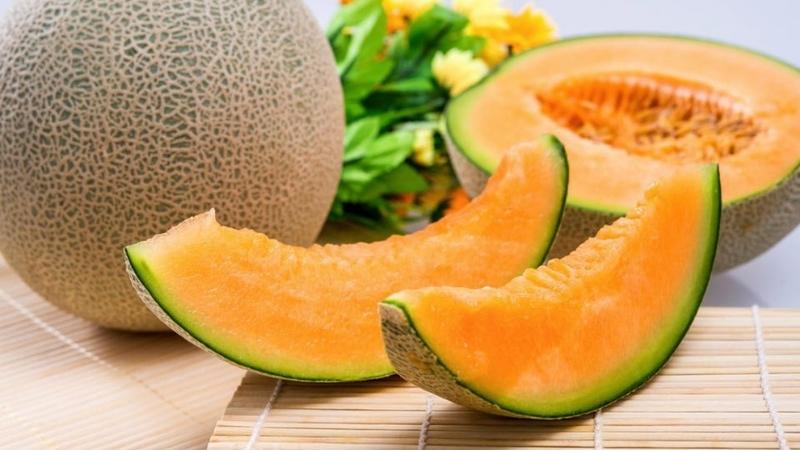 Calorie Content of 100g Cantaloupe
Calorie Content of 100g Cantaloupe
3 Will Eating Cantaloupe Make You Fat?
As mentioned earlier, cantaloupe contains only 34-40 calories per 100 grams, so it will not cause weight gain. In fact, it can support effective weight loss and provide a lasting feeling of fullness, reducing the urge to eat more.
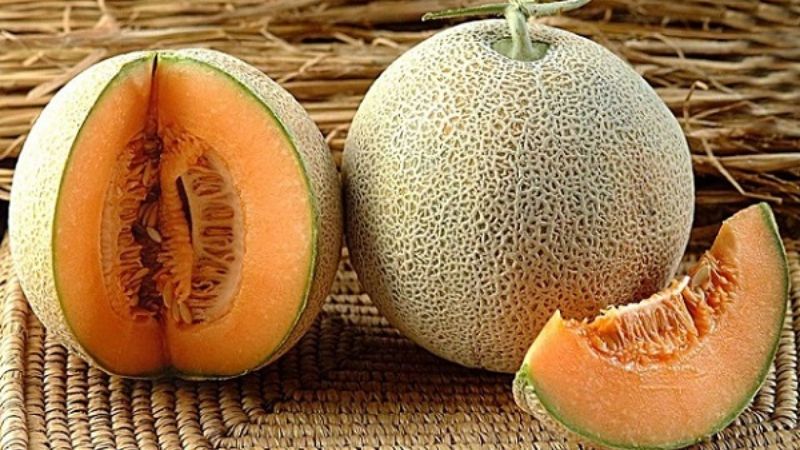 Will Eating Cantaloupe Make You Fat?
Will Eating Cantaloupe Make You Fat?
4 Notes on Eating Cantaloupe for Optimal Health
New mothers should avoid eating cantaloupe as it is high in fiber and may not be suitable for their post-partum recovery diet. Instead, focus on consuming plenty of fluids and nutritious foods to support lactation. Additionally, cantaloupe may cause a feeling of fullness and loss of appetite, which can affect energy levels needed for caring for a newborn.
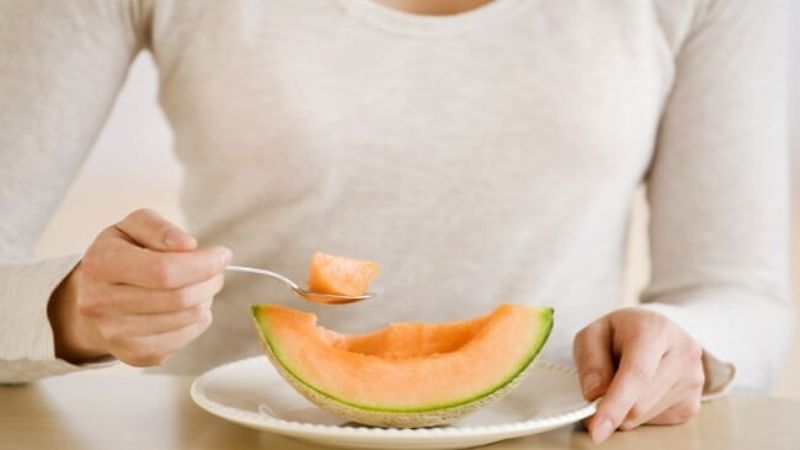 Considerations When Eating Cantaloupe
Considerations When Eating Cantaloupe
For those who are underweight or recovering from an illness and need to gain weight, cantaloupe may not be the best choice as it can reduce appetite and make it difficult to consume enough calories and nutrients.
Cantaloupe is high in potassium, so if you have a history of liver, kidney, or chronic intestinal inflammation, it is best to avoid consuming it.
People with a fever should also refrain from eating cantaloupe as its cooling properties may worsen the condition.
5 Delicious Cantaloupe-Based Recipes
Japanese Cantaloupe Bread
This bread has a crispy and fragrant crust, with a soft and fluffy interior. It has a subtle sweetness and a rich, buttery flavor. It’s a great option for breakfast or as a snack!
For the full recipe, check out:
 Japanese Cantaloupe Bread
Japanese Cantaloupe Bread
Cantaloupe and Egg Yolk Ice Cream
This ice cream has a delicate, pale yellow color and a smooth, creamy texture. It combines the sweetness of cantaloupe with the richness of egg yolks, resulting in a delicious and unique flavor. It’s the perfect treat for a hot summer day!
For the full recipe, visit:
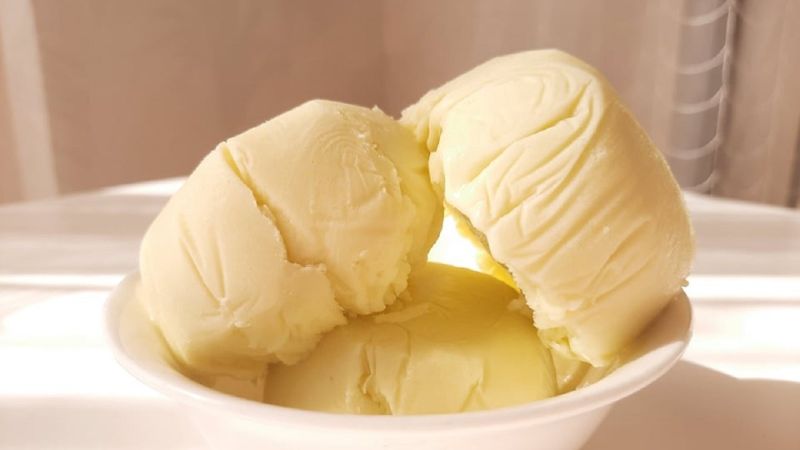 Cantaloupe and Egg Yolk Ice Cream
Cantaloupe and Egg Yolk Ice Cream
Cantaloupe Cake
Cantaloupe cake is a refreshing and delicious dessert with a crisp texture from the cantaloupe and a rich, creamy flavor from the cream, milk, and condensed milk. It’s a great choice for a special occasion or to impress your loved ones.
For the full recipe, go to:
 Cantaloupe Cake
Cantaloupe Cake
Cantaloupe Tea
This fragrant and colorful tea combines the sweetness of cantaloupe with the refreshing taste of mint and the tanginess of pomegranate. It’s a unique and delightful drink that’s perfect for cooling off on a hot day.
To make this refreshing tea, follow the recipe here:
 Cantaloupe Tea
Cantaloupe Tea
Cantaloupe Smoothie
The cantaloupe smoothie is a vibrant, golden-hued drink with a distinctive aroma and a subtle sweetness. It’s refreshing, nutritious, and perfect for a family get-together on a weekend.
To blend up this tasty treat, check out the recipe here::
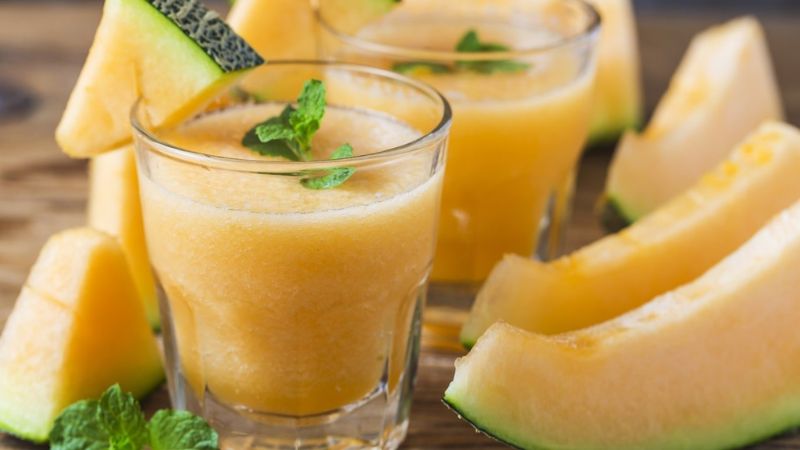 Cantaloupe Smoothie
Cantaloupe Smoothie
We hope that this comprehensive overview of cantaloupe’s nutritional benefits and usage tips will help you incorporate this delicious fruit into your diet in a healthy and enjoyable way. Enjoy!
Sources: United States Department of Agriculture, Thanh Nien newspaper

































